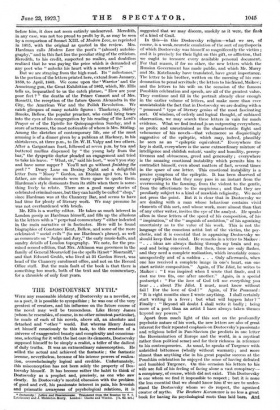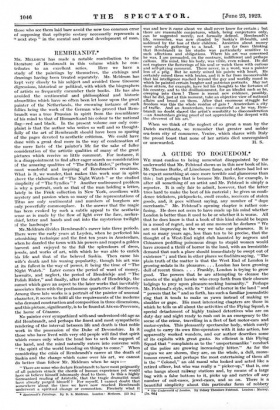THE DOSTOEVSKY MYTH.*
WITH any reasonable idolatry of Dostoevsky as a novelist, or as a poet, it is possible to sympathize ; he was one of the very greatest of creators, and his influence on the future course of the novel may well be tremendous. Like Henry James (whom he resembles, of course, in no other minutest particular), he made of each of his novels, above all, an absolute and detached and " other " world. But whereas Henry James set himself consciously to this task, to this creation of a universe of exaggerated beauty and complexity and conscious- ness, selecting for it with the last care its elements, Dostoevsky supposed himself to be simply a realist, a teller of the daffiest of daily truths. It was an extraordinary misconception. He willed the actual and achieved the fantastic ; the fantastic become, nevertheless, because of his intense powers of realiza- tion, overwhelmingly logical and credible. Unfortunately, this misconception has not been solely the property of Dos- toevsky himself. It has become rather the habit to think of Dostoevsky as a prophet and, precisely, as one who saw clearly. In Dostoevsky's morbid obsession with the problem of good and evil, his passionate interest in pain, his feverish and prismatic awareness of psychological relations, it is • Dogeoesss: Leant and Aletotitiseenops. Translated from the Russian by S. S. ECoteliansky and J. Middleton Murry. London : Chatto and Wlndus. (7s. ed. net.] suggested that we may discern, smokily as it were, the flash of a kind of Grail.
In this—in this Dostoevsky religion—what we see, of
course, is a weak, neurotic emulation of the sort of mythopoeia of which Dostoevsky was himself so magnificently the victim ; and it is precisely for their light on this gift, or affliction, that we ought to treasure every available personal document. For that reason, if for no other, the new letters which the Russian Government has made public, and which Mr. Murry and Mr. Koteliansky have translated, have great importance.
The letter to his brother, written on the morning of his con- demnation to penal servitude ; the letters to his friend, Maikov ; and the letters to his wife on the occasion of the famous Poushkin celebration and speech, are all of the greatest value.
They continue and fill in the portrait already clear enough in the earlier volume of letters, and make more than ever unmistakable the fact that in Dostoevsky we are dealing with a " possessed " type of literary genius of the most fascinating sort. Of wisdom, of orderly and logical thought, of unbiased observation, we may search these letters in vain for much evidence. What we find instead is an outpouring everywhere, as prolix and unrestrained as the characteristic flight and vehemence of his novels--that vehemence so disquietingly suggestive of the epileptic, which may, indeed, plausibly be seen as an " epileptic equivalent." Everywhere the key is shrill, everywhere is the same extraordinary mixture of intelligence and childish nalveld, vanity and humility, percep- tiveness and obtuseness, greed and generosity ; everywhere is the amazing emotional instability which permits him to contradict himself, even about matters of fact, several times in the space of one letter. This emotional instability is a precise symptom of the epileptic. It has been observed of many epileptics that they may pass in an instant from the overweening to the fawning, from the violent to the gentle, from the affectionate to the suspicious ; and that they are peculiarly subject to a kind of mawkish religiosity. We need not press the point. But it is clear that in Dostoevsky we are dealing with a man whose behaviour contains vivid elements of this sort, and whose work, more almost than that of any other writer, invites the eye of the analyst. He speaks often in these letters of the speed of his composition, of his " inspiration," of the " anguish of ambition," of his agonizing uncertainty as to the value of his work. This is not the language of the conscious artist but of the victim, the psy- chotic, and it is essential that in appraising Dostoevsky we should keep that in mind. He remarks in a letter to Maikov : " . . . ideas are always flashing through my brain and my soul and being conceived. But then, these arc only flashes, and they need a complete realization, which invariably comes unexpectedly and of a sudden . . . Only afterwards, when one has received a complete image in one's heart, can one start artistic composition." Again, of The Idiot, he writes to Maikov : " I was inspired when I wrote that finale, and it cost me two fits, one after another." Again, in a special postscript : " For the love of God tell me everything you hear . . . about The Idiot. I must, must know without fail For the love of God I " Again, of The Possessed : " It is eight months since I wrote anything. I shall certainly start writing in a fever ; but what will happen later ? " Finally : " Beyond all doubt I shall write it badly ; being more of a poet than an artist I have always taken themes beyond my powers."
Apart from much light of this sort on the profoundly psychotic nature of his work, the new letters are also of great interest for their repeated emphasis on Dostoevsky's passionate and religious belief in Pan-Slavism (he predicts in one letter the Russianization of Europe and the world, in a mystical rather than political sense) and for their richness in reference to his contemporaries. As usual, he speaks of Turgenev with unbridled bitterness (wholly without warrant) ; and more almost than anything else in his great popular success at the Poushkin celebration he enjoyed the sense of having defeated and humbled Targenev. On this occasion his letters to his wife are full of his feeling of facing alone a vast conspiracy— a conspiracy, of course, which did not exist. This Dostoevsky is one whom we find it impossible to respect ; but it is none the less essential that we should know him if we are to under- stand the Dostoevsky whom we do respect, the agonized creator of myths. The Brothers Karanmov is no less a great book for having its psychological roots thus laid bare. And
those who see them laid bare avoid the now too common error of supposing that epileptic ecstasy necessarily represents a " next step " in the mental and moral development of man.











































 Previous page
Previous page